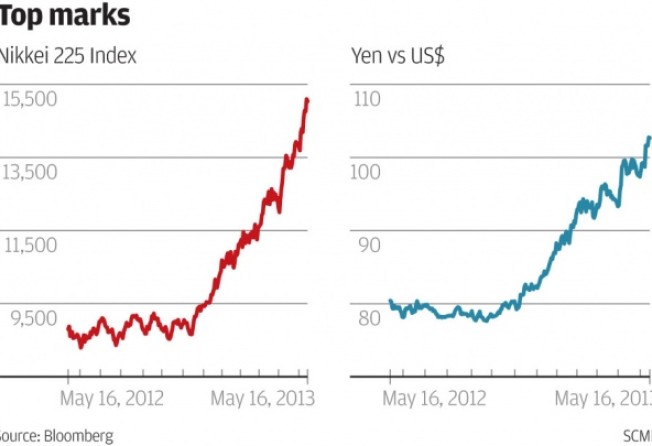After a stellar start, Japan's 'Abenomics' faces dim future
Shinzo Abe is popular now, but he still has to steer his fiscal programme through to a successful conclusion and pull off structural reforms

Shinzo Abe may not have made many friends among his North Asian neighbours lately, but to international investors the Japanese prime minister is a star.
In the six months since Abe emerged as the likely winner of last December's election, Japan's Nikkei 225 stock index has soared by 74 per cent, easily beating the rest of the world's major markets.
Then yesterday, Tokyo announced that Japan's economy grew by 0.9 per cent in the first quarter of the year.
That might not sound like much, but it translates into an annualised 3.5 per cent rate, which is well above Japan's 20-year average of 0.9 per cent and fast enough to make Japan the fastest growing of all the world's major developed economies.
Even better, by far the biggest contributor to the first quarter's growth came from consumer spending; evidence to many that the prime minister's pledge to revitalise Japan's ailing economy with his radical "Abenomics" policy package is working.
Abenomics is a bow with three arrows: monetary policy, fiscal policy and structural reform. So far it is the monetary arrow that has attracted all the attention, after the Bank of Japan pledged to double Japan's monetary base, in an attempt to lift the economy out of deflation and hit its 2 per cent inflation target by the end of next year. The impact has been dramatic. Over the past six months the yen has plunged 23 per cent against the US dollar, and a touch more against the yuan and the euro.
If the trend continues, the resulting increase in import costs may be enough by itself to achieve 2 per cent inflation.
But that is not the only effect. Thanks to the falling yen, Japanese exporters have suddenly found much of their lost competitiveness has been restored, and profits are rising. Morgan Stanley expects Japanese corporate earnings to jump by 50 per cent this year.
That has pushed up stock prices, generating a wealth effect which has encouraged Japan's cautious consumers to open their wallets, boosting domestic activity. So far, Abenomics seems to have scored a bullseye.
But there are concerns. Japan's Asian trading partners are already grumbling about competitive devaluation. More to the point, currency depreciation can only provide a one-off kick to prices. When the yen stops falling, imported inflation will disappear.
In any case, monetary policy alone cannot solve Japan's problems, and there are worries that Abe's second and third arrows will miss their targets.
On the fiscal side, Abe announced a 10 trillion yen spending package back in January. But as Julian Jessop at independent research house Capital Economics points out, such supplementary budgets are standard in Japan, and the stimulative effect will be small.
Next year it will disappear altogether. In an attempt to allay concerns about the size of government debt, and to restore Tokyo's fiscal credibility, Abe plans to raise Japan's consumption tax from 5 per cent to 8 per cent, increasing it again to 10 per cent in 2015.
This amounts to a major fiscal tightening, and is bound to bring back memories of April 1997, when the government raised its consumption tax from 3 per cent to 5 per cent, halting Japan's emerging upturn in its tracks and plunging the economy into recession.
Then there is the third arrow: structural reform. Japan's economy badly needs a whole suite of reforms to open protected domestic sectors to competition, deregulate the labour market and offset a declining working age population by encouraging more women into employment.
To push them through Abe needs to win July's elections for the upper house of parliament. Even then, his agenda is likely to face stiff opposition from entrenched interests.
The record of past reformers is hardly encouraging. Although Abe appears to have made a strong start, history indicates that his star could soon wane.